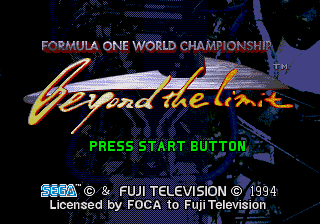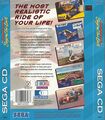Difference between revisions of "Formula One World Championship: Beyond the Limit"
From Sega Retro
| Line 60: | Line 60: | ||
'''Game Designer:''' [[Taka_Oh]], Mike, Iaka, Q‑Taro<br> | '''Game Designer:''' [[Taka_Oh]], Mike, Iaka, Q‑Taro<br> | ||
'''Graphic Designer:''' K1, Hirorih, Sanchan, Milcha, Tamamura, Geny<br> | '''Graphic Designer:''' K1, Hirorih, Sanchan, Milcha, Tamamura, Geny<br> | ||
| − | '''Programmer:''' Dehehe, H.Suckmatt, Todo, Tek<br> | + | '''Programmer:''' [[Dehehe]], H.Suckmatt, Todo, Tek<br> |
'''Test Course Design:''' Kazuhito Kawai<br> | '''Test Course Design:''' Kazuhito Kawai<br> | ||
: '''Sound Staff''' | : '''Sound Staff''' | ||
Revision as of 05:21, 20 July 2014
| Formula One World Championship: Beyond the Limit (US/EU), Heavenly Symphony (JP) | |||||
|---|---|---|---|---|---|
| System(s): Sega Mega-CD | |||||
| Publisher: Sega | |||||
| Developer: Fuji Television | |||||
| Genre: Racing | |||||
| |||||
Formula One World Championship: Beyond the Limit, known as Formula One World Championship: Heavenly Symphony in Japan, is a racing game for the Sega Mega-CD named as such as the individual engines that were recorded for the cars put the developers in awe and thought it sounded like a symphony. This is also one of the first racing games that uses separate recorded engine sounds from each car, which would become standard practise in the future. It is also based off the 1993 Formula One World Championship, complete with appropriate licensing from FOCA, using each individual driver and car, with the exception of Ayrton Senna. Instead, his name and car number can be defined by the player.
Contents
Gameplay
The game takes place in a first person view from the cockpit, like many racing games on the early era consoles, but instead of using pre-defined road pieces or background deformation, this game makes use of the Sega Mega-CD's extra hardware and uses scaling and rotation of an image, similar to the Super Nintendo's Mode 7. This effect is also used in Sonic CD's Special Stages and various other games.
All 16 tracks are available from the 1993 season, including the fictional Sega Park, given the location of Japan. The tracks themselves are accurate recreations of the real tracks, with appropriate elements from their real-life counter-part. For example, Donington Park, which was sponsored by SEGA, had various SEGA logos littered all over the place (with various billboards of Sonic the Hedgehog).
Modes
Like most racing games, this features a main Grand Prix mode, where you take the reins and take the 1993 season on. You will start off on the Sega Park test track, in a very generic car. From your performance, you will be able to select a team to drive for and make your contract. Based on how the player does during the season, they can either get new contract offers, or get fired from their current team. There are 4 save files to use for this mode, the player can do the season as various teams, or to be allowed for a friend's save.
There is also a 1993 Mode, allowing the player to take on challenges based off events in the 1993 season. For example, for the European Grand Prix, the player must take the role of Rubens Barrichello for 6 laps on Donington Park. The rain is at play and drivers are constantly pitting in with the changing weather. Rubens' tires are wearing out, and the player must pit, retain position, and don't let the Williams driver, Damon Hill, overtake Rubens. Upon selecting a scenario, a FMV will play showcasing a bit of the race's events, then transition into the gameplay. There are also another 4 saves for this mode.
Finally, there is a Free Run mode, where the player can drive on any track, with any amount of laps, any car of their choice, and the choice of weather.
Tobacco Sponsoring
This game controversially uses Tobacco Sponsoring. While it was standard practise for other racing games to avoid this, it would seem to be complete ignorance by the Japanese developers, despite being under supervision of FOCA and Fuji Television. Various sponsors, while visible in the cutscenes, are visible on cars and the track - Player's LTEE, for example, on the Canadian Grand Prix, and Camel on the Benneton.
Localisation Changes
In addition to the name change, various other changes were made for the American and European release. These include;
- The game was made notably more easy for the localised release. The Japanese release, for example, is slower, and engine failure is a much higher possibility. Additionally, use of the boost for longer than one lap would cause an engine failure, in accordance to one of the texts in the game. Instead, it would take around 4 laps in the exported version.
- The heads-up-display was moved to the bottom of the screen in the localised release, whereas it was on the top in Japan.
- Various songs were given different usages between versions.
- In 1993 mode, the Japanese release had music playing while racing, which went unused in the exported game.
- A bonus menu could be accessed when the player won the Driver's Championship and the Constructors Championship, giving access to all the FMVs in the game. This was not in the Japanese version.
Production Credits
- Staff
Producer: Ossy, Jitsunosuke Kawai (Fuji Television)
Project Manager: Kunio Numabe (Fuji Television)
Director: Yasuo Namitome (Fuji Television), Kyamura, Taka_Oh
Program Director: Dehehe
Art Director: K1
Sound Director: Macky
Game Designer: Taka_Oh, Mike, Iaka, Q‑Taro
Graphic Designer: K1, Hirorih, Sanchan, Milcha, Tamamura, Geny
Programmer: Dehehe, H.Suckmatt, Todo, Tek
Test Course Design: Kazuhito Kawai
- Sound Staff
Producer: Yasuo Namitome (Fuji Television), Macky
Composer: Yoshimasa Inoue, Mo, Junjun, So, Milpo, J.Shira, Watch, Lotty
Arranger: Kanichiro Kubo, Yoshio Tsuru
Sound Programmer: Macky, Jimmy
Sound Effect: Macky, Junjun, Ker Akiyama
- U.S.A. Staff
Director: Atsushi "Sushi" Kosugi (Beat On Beat, Inc. N.Y.)
Recording Engineer: Patrick Dillett, Michael Conrader
Mix Engineer: Patrick Dillett
Assistant Engineer: Justin Lucher, Hiro Ishihara
Musicians: Larry Mitchell, Yossi Fine, Alex Alexander, Tommy Mandel, Dana Calitri, Gwen Guthrie, Andy Snitzer, Kurtis King, Anders Bostrom, Hiram Bullock, Willine Martinez
- East 4th Hones (John Allmark, John Scarpulla, John Wheeler)
Tsunekazu Aoki, Tetsuo Sakurai, Yoshihiro Tomonari, Takuo Uchida, Yukiyoshi Hujimoto, Yoshio Nomura, Masahiro Inaba, Hisanori Kumamaru, Funky Fujisawa, Jake H. Conception, Jun De Martini
- Naration Staff
Producer: Masashi Takamiya (J-Wave Music)
Narator: Chris Peppler
Supervisor: Tetsuo Hamaguchi (Fuji Television), Nobuhiro Kasai (Fuji Television), Masanari Funaki (Fuji Television), Hirofumi Matsuno (Fuji Television), Jyun Minegishi (Fuji Television)
Special Thanks: Rascal Fuku-Chan, Tetsu, Shigeyuki, Tatsuyan (HIC), Ykki (HIC), Sam Ohashi, Takumi, Ann, Samaore, Tac Iwd, Wagamama Sam, Masu, Chepeat, Bossanova Oyz, T.S., Hirochan, Hiyo‑Hiyo, Yutaka Kobari (Fuji Television), Kenji Hoshiya (Fuji Television), Noriyuki Sakai, Hideto Kurihara, Makoto Satou, Masahiro Saito, Takehiro Motoyoshi, Nahna
- Yuki, Crystal, Takako (Beat On Beat, Inc. N.Y.)
Senior Supervisor: Kazuhito Kawai
Presented by: Sega, Fuji Television Network, Inc.
Physical Scans
| Sega Retro Average | ||||||||||||||||||||||||||||||||||||||||||||||||||||||||||||||||||||||||||||||||||||||||||||||||||||||||||||||||||||||||||||||||||||||||||||||||
|---|---|---|---|---|---|---|---|---|---|---|---|---|---|---|---|---|---|---|---|---|---|---|---|---|---|---|---|---|---|---|---|---|---|---|---|---|---|---|---|---|---|---|---|---|---|---|---|---|---|---|---|---|---|---|---|---|---|---|---|---|---|---|---|---|---|---|---|---|---|---|---|---|---|---|---|---|---|---|---|---|---|---|---|---|---|---|---|---|---|---|---|---|---|---|---|---|---|---|---|---|---|---|---|---|---|---|---|---|---|---|---|---|---|---|---|---|---|---|---|---|---|---|---|---|---|---|---|---|---|---|---|---|---|---|---|---|---|---|---|---|---|---|---|---|
|
| 71 | |
|---|---|
| Based on 28 reviews | |
| Mega-CD, BR |
|---|
|
- ↑ Beep! MegaDrive, "May 1994" (JP; 1994-04-08), page 20
- ↑ Computer & Video Games, "October 1994" (UK; 1994-09-15), page 93
- ↑ Edge, "July 1994" (UK; 1994-05-26), page 74
- ↑ Electronic Games (1992-1995), "October 1994" (US; 1994-xx-xx), page 116
- ↑ Famitsu, "1994-04-29" (JP; 1994-04-15), page 1
- ↑ Game Players, "Vol. 7 No. 10 October 1994" (US; 1994-xx-xx), page 100
- ↑ GamePro, "November 1994" (US; 1994-xx-xx), page 195
- ↑ GamesMaster, "July 1994" (UK; 1994-06-30), page 59
- ↑ Games World: The Magazine, "January 1995" (UK; 1994-11-xx), page 21
- ↑ Hippon Super, "June 1994" (JP; 1994-04-30), page 61
- ↑ Joypad, "Juillet/Août 1994" (FR; 1994-0x-xx), page 30
- ↑ Joypad, "Décembre 1994" (FR; 1994-1x-xx), page 55
- ↑ MAN!AC, "07/94" (DE; 1994-06-08), page 68
- ↑ Mega, "July 1994" (UK; 1994-06-16), page 40
- ↑ Mega Force, "Septembre 1994" (FR; 1994-0x-xx), page 112
- ↑ Mega Fun, "07/94" (DE; 1994-06-22), page 52
- ↑ Mega Fun, "10/94" (DE; 1994-09-21), page 57
- ↑ Mega Power, "July 1994" (UK; 1994-06-23), page 38
- ↑ Player One, "Décembre 1994" (FR; 1994-1x-xx), page 148
- ↑ Play Time, "10/94" (DE; 1994-09-07), page 108
- ↑ Sega Magazine, "September 1994" (UK; 1994-08-xx), page 78
- ↑ Sega Power, "August 1994" (UK; 1994-07-07), page 54
- ↑ Sega Pro, "July 1994" (UK; 1994-06-16), page 48
- ↑ Sega Megazone, "October 1994" (AU; 1994-xx-xx), page 26
- ↑ Sega Saturn Magazine, "September 1995" (JP; 1995-08-08), page 85
- ↑ Todo Sega, "Septiembre 1994" (ES; 1994-0x-xx), page 58
- ↑ Video Games, "10/94" (DE; 1994-09-28), page 90
- ↑ VideoGames, "October 1994" (US; 1994-xx-xx), page 91
- No players field
- Old content rating field
- All games
- Old-style rating (cvg)
- Old-style rating (edge)
- Rating without PDF source
- Old-style rating (joypad)
- Old-style rating (mega)
- Old-style rating (megapower)
- Old-style rating (playerone)
- Old-style rating (segapower)
- Old-style rating (segapro)
- Update ratings template
- 7 old ratings








